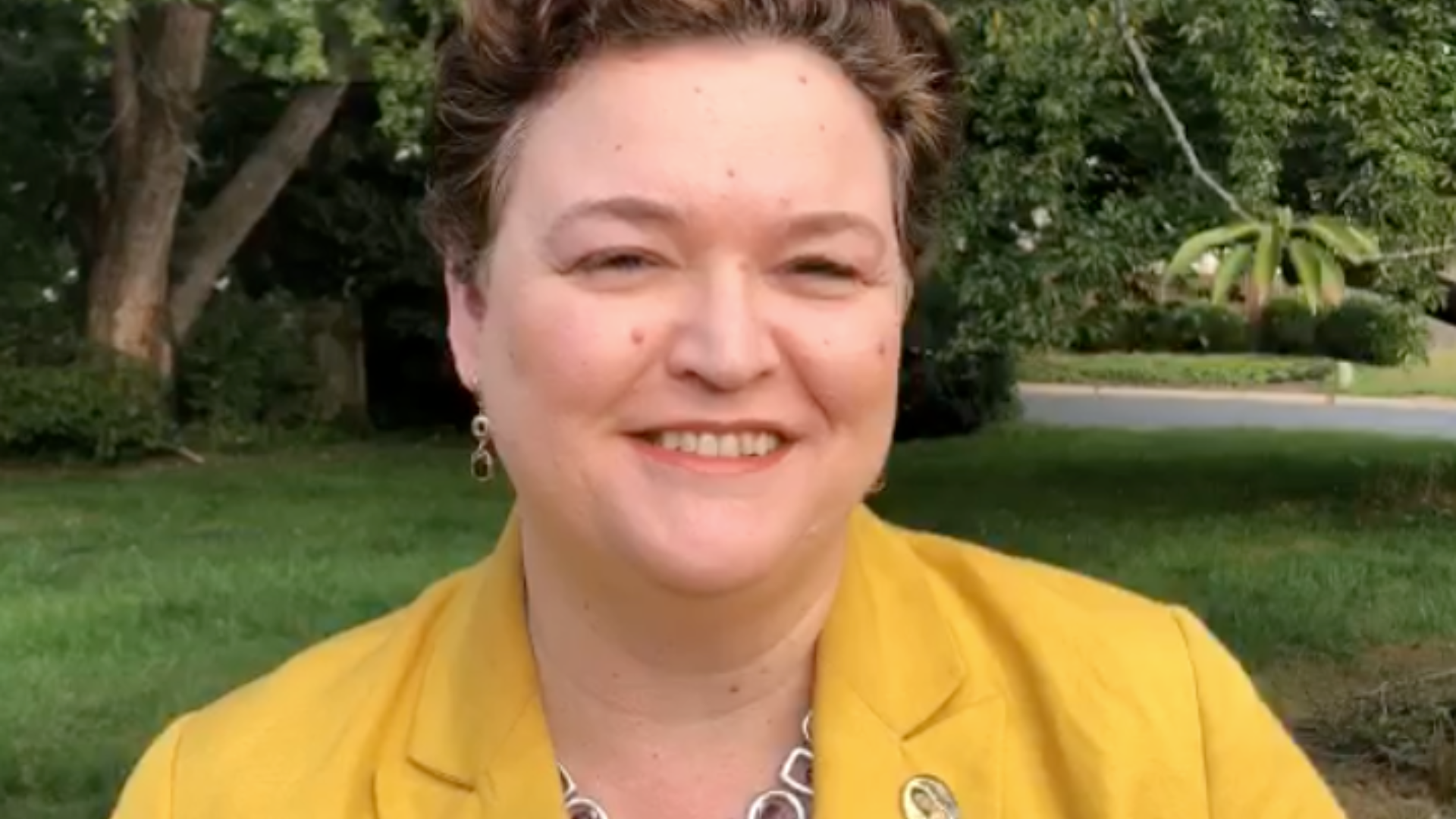Address to NCADDHM, National Catholic Association of Diocesan Directors for Hispanic Ministry
Opening Keynote September 28, 2021
by Mar Muñoz-Visoso
Synodality is a spiritual journey in a gradual process of transformation
The theme of the Annual Conference of NCADDHM, National Catholic Association of Diocesan Directors for Hispanic Ministry (28-30 September 2021) was : “Living synodality in Hispanic Ministry”. The opening keynote was given by Mar Muñoz-Visoso, executive director of the Secretariat of Cultural Diversity in the Church at USCCB.
We believe that this is a document of great relevance for the Church in the United States, which is faced with the great challenge of finding ways to be prophetic and synodal in order to be able to fulfill her mission in the country.
We offer here the whole speech of Mar Muñoz-Visoso at the mentioned conference:
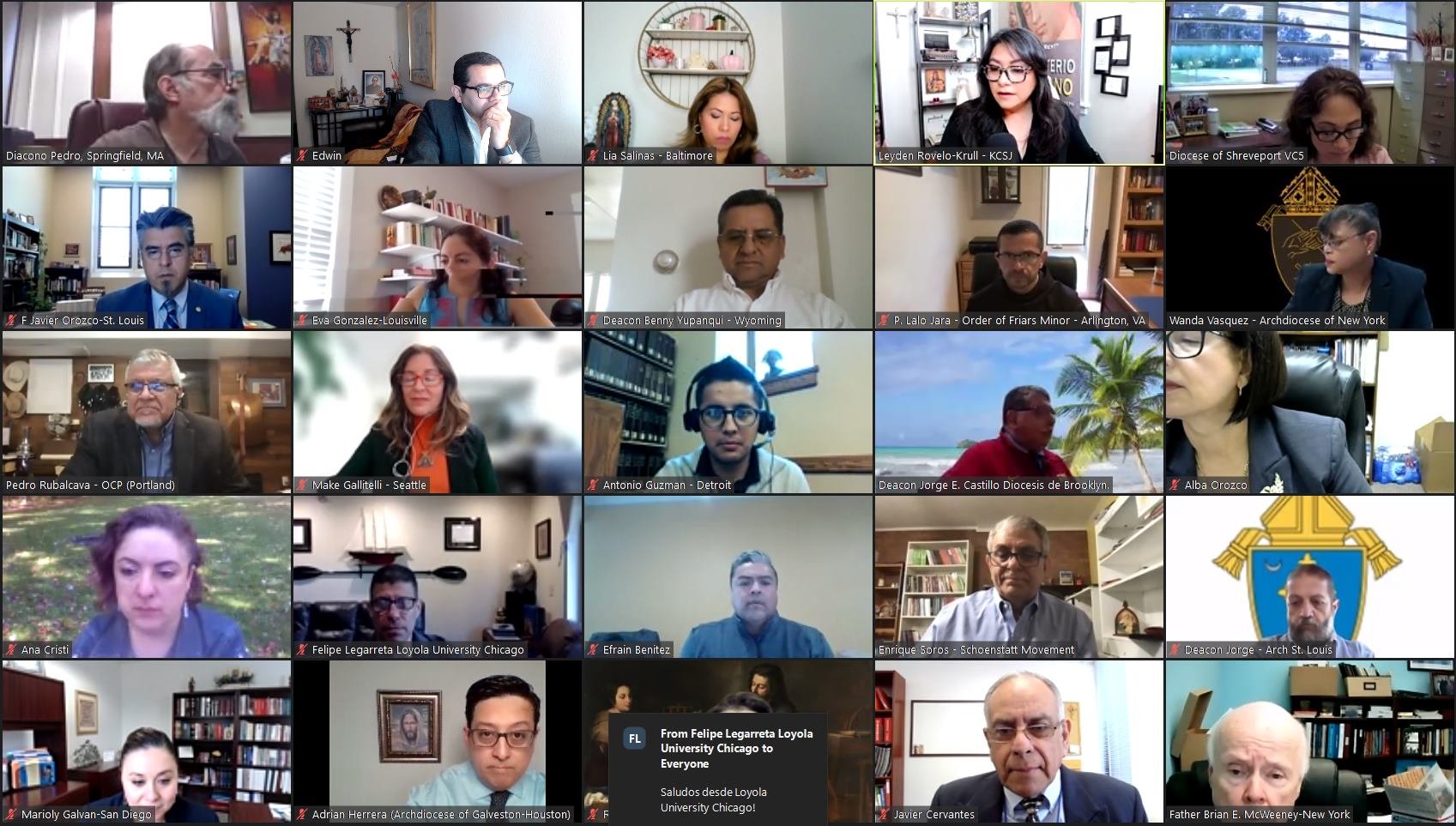
Synodality is both her way of being and of fulfilling her mission in the world
The theme of our gathering is Living Synodality in Hispanic Ministry / Viviendo la sinodalidad en el ministerio hispano. In order to “live out” something we need to first understand what it is and what it demands from us. Only then we can see whether we are really living up to our call.
It is a very timely topic because, as many of you know, Pope Francis has called the church world-wide to reflect on synodality as the path for the Church, el camino de la Iglesia. It is both her way of being and of fulfilling her mission in the world.
I will touch also on a few experiences we have had with “synodality” in Hispanic ministry over the years, as well as propose a challenge for all of us Hispanic/Latino Catholics in the United States and those working in Hispanic ministry.
That is the order of my presentation today: Entender el concepto de sinodalidad, la luz que nos da el papa Francisco y su llamado a la Iglesia universal a reflexionar sobre la sinodalidad en la vida de la Iglesia. Algunas experiencias de sinodalidad en el ministerio hispano y un reto para nosotros los Hispanos Latinos y los que nos acompañan en el ministerio.
What is synodality?
So let’s begin with a definition. What is synodality? The term comes from the Greek syn-odos, and it has been translated in different ways: “walking together”, “journeying together”, “walking alongside”, in a sense, being, moving and operating together.
It is not a new concept. In fact, it is a very ancient practice. As the Preparatory Document for the synod reminds us, it was the ordinary way in which the Church acted in the first millennium. (PD, 11) And even at those times when the hierarchical functions were more strongly emphasized in subsequent centuries, the Church never lost her synodal dimension, through the celebration of local/diocesan and provincial synods and universal or Ecumenical Councils. Synodality is a constitutive element of her being. La sinodalidad, presente a lo largo de los siglos, unas veces más visible y generalizada que otras pero siempre constitutiva del ser y actuar de la Iglesia.
The Second Vatican Council calls for a return to the sources (resourcement), vuelta a las fuentes, and for “una puesta al día” (aggiornamento) a reading of the signs of the times. The Council is anchored in this dynamic of Tradition and puts an emphasis in rediscovering the Church as the People of God, redescubrir la Ia Iglesia como el Pueblo de Dios. I quote from the Synod’s Preparatory Document, which in turn, is quoting the Dogmatic Constitution on the Church, Lumen Gentium:
It emphasizes that “God, however, does not make men holy and save them merely as individuals, without bond or link between one another. Rather it has pleased Him to bring men together as one people, a people which acknowledges Him in truth and serves Him in holiness” (LG, no. 9). The members of the People of God are united by Baptism, and “if by the will of Christ some are made teachers, pastors and dispensers of mysteries on behalf of others, yet all share a true equality with regard to the dignity and to the activity common to all the Faithful for the building up of the Body of Christ” (LG, no. 32). Therefore, all the Baptized, participants in Christ’s priestly, prophetic, and kingly functions by “exercising the variety and ordered richness of their charisms, their vocations and their ministries,” are active subjects of evangelization, both individually and as the entire People of God. (PD 12)
The Council also emphasized how, by virtue of the anointing of the Holy Spirit received in Baptism, the totality of the Faithful “cannot err in matters of belief.” (Sensus Fidei) (PD 13) Individually we may, but not as a whole People.
For this reason, the Pastors, established by God as “authentic guardians, interpreters and witnesses of the faith of the whole Church,” should not be afraid to listen to the Flock entrusted to them. (PD 14; Francis, Address at Ceremony Commemorating 50th Anniversary of the Institution of the Synod)
Pero ojo, y esto es importante, la consulta del pueblo de Dios no implica la asunción de procesos políticos y democráticos donde priman la mayorías; no se trata de que ganen unos y pierdan otros, no.
The consultation of the People of God does not imply the assumption within the Church of the dynamics of democracy based on the principle of majority, because there is, at the basis of participation in every synodal process, a shared passion for the common mission of evangelization and not the representation of conflicting interests. In other words, this is an ecclesial process that can only take place “at the heart of a hierarchically structured community.” So, it is in the fruitful bond between the sensus fidei of the People of God and the magisterial function of the Pastors that the unanimous consensus of the whole Church in the same faith is realized. Every synodal process, in which the Bishops are called to discern what the Spirit is saying to the Church, not by themselves but by listening to the People of God, …is an evident form of that “journeying together” which makes the Church grow. (PD 14)
Pope Benedict, some may recall, had already called in an address to the presbyterate of Rome, to see the laity as co-responsible for the Church, not just mere collaborators. Pope Francis takes on the call and the challenge proposed by the II Vatican Council and reminds us that to fulfill our mission in the world in the Third Millenium, the Holy Spirit calls us to be a synodal Church through and through. Para cumplir nuestra misión en el mundo de hoy la Iglesia debe ser y actuar en una forma más evidentemente sinodal.
Synodality is understood here as the modus vivendi and the modus operandi, the way of being Church. Thus understood, synodality goes beyond mere consultation; it’s about listening and learning from one another, discerning together what is the will of the Holy Spirit at this time and at this moment, informing the decision making and taking action together. Again, it is about the shepherds and the People of God entrusted to their care “journeying together”, caminando juntos, and never one without the other (the bishops without the People of God, or the people without their shepherds).
Francis also challenges the Church of today to stretch our imagination and do the work that it takes to be a truly synodal Church. Sinodality as a way of being goes beyond just certain kinds of meetings or consultation with established structures such as the Synods of Bishops, or the presbyteral councils, for example.
Note here the opening words of the preparatory document for the upcoming Synod on Synodality: “The Church of God is convoked in Synod”. ( “La Iglesia de Dios es convocada en Sínodo”). It does not say “the Bishops are convoked”, but the “whole-Church” is convoked. Sure, an important part of the synodal process will be the General Assembly of the Synod of Bishops, in October of 2023. But to get there, and for that assembly of bishops to be fruitful, for it to fulfill its mandate, a church-wide consultation of the People of God needs to take place first, beginning with the consultation of the local/diocesan churches and ending with their involvement again in the implementation phase. Quoting again from the Preparatory Document:
With this convocation, Pope Francis invites the entire Church to reflect on a theme that is decisive for its life and mission: “It is precisely this path of synodality which God expects of the Church of the third millennium.” This journey, which follows in the wake of the Church’s “renewal” proposed by the Second Vatican Council, is both a gift and a task: by journeying together and reflecting together on the journey that has been made, the Church will be able to learn through Her experience which processes can help Her to live communion, to achieve participation, to open Herself to mission. Our “journeying together” is, in fact, what most effectively enacts and manifests the nature of the Church as the pilgrim and missionary People of God. (PD, 1 continued)
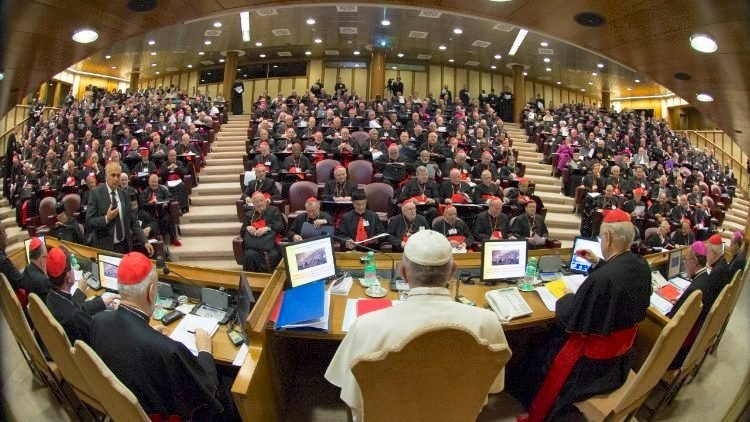
Synodality takes effort, patience, openness, commitment and persistence
What steps does the Spirit invite us to take in order to grow as a synodal Church? Addressing this question together requires listening to the Holy Spirit, who like the wind “blows where it wills,”… and remaining open to the surprises that the Spirit will certainly prepare for us along the way. Thus, a dynamism is activated that allows us to begin to reap some of the fruits of a synodal conversion, which will progressively mature. (PD, 2)
Communion, Participation and Mission
The theme of the synod is “For a synodal Church: Communion, Participation and Mission.”
(From the Vademecum for the Synod)
The three dimensions of the theme are communion, participation, and mission. These three dimensions are profoundly interrelated. They are the vital pillars of a Synodal Church. There is no hierarchy between them. Rather, each one enriches and orients the other two. There is a dynamic relationship between the three that must be articulated with all three in mind.
Communion: By his gracious will, God gathers us together as diverse peoples of one faith, through the covenant that he offers to his people. The communion we share finds its deepest roots in the love and unity of the Trinity. It is Christ who reconciles us to the Father and unites us with each other in the Holy Spirit. Together, we are inspired by listening to the Word of God, through the living Tradition of the Church, and grounded in the sensus fidei that we share. We all have a role to play in discerning and living out God’s call for his people.
Participation: A call for the involvement of all who belong to the People of God – laity, consecrated and ordained – to engage in the exercise of deep and respectful listening to one another. This listening creates space for us to hear the Holy Spirit together, and guides our aspirations for the Church of the Third Millennium. Participation is based on the fact that all the faithful are qualified and are called to serve one another through the gifts they have each received from the Holy Spirit. In a synodal Church the whole community, in the free and rich diversity of its members, is called together to pray, listen, analyse, dialogue, discern and offer advice on making pastoral decisions which correspond as closely as possible to God’s will (ICT, Syn., 67-68). Genuine efforts must be made to ensure the inclusion of those at the margins or who feel excluded.
Mission: The Church exists to evangelize. We can never be centred on ourselves. Our mission is to witness to the love of God in the midst of the whole human family. This Synodal Process has a deeply missionary dimension to it. It is intended to enable the Church to better witness to the Gospel, especially with those who live on the spiritual, social, economic, political, geographical, and existential peripheries of our world. In this way, synodality is a path by which the Church can more fruitfully fulfil her mission of evangelization in the world, as a leaven at the service of the coming of God’s kingdom.
If listening is the method of the Synodal Process, and discerning is the aim, then participation is the path. Fostering participation leads us out of ourselves to involve others who hold different views than we do. Listening to those who have the same views as we do bears no fruit. Dialogue involves coming together across diverse opinions. Indeed, God often speaks through the voices of those that we can easily exclude, cast aside, or discount. We must make a special effort to listen to those we may be tempted to see as unimportant and those who force us to consider new points of view that may change our way of thinking.

Objectives of synodality
The objectives “of great importance for the quality of ecclesial life and for accomplishing the mission of evangelization”, which spell out synodality as the form, the style, and the structure of the Church, her way of being are defined as follows: (PD 2)
• recalling how the Spirit has guided the Church’s journey through history and, today, calls us to be, together, witnesses of God’s love;
• living a participative and inclusive ecclesial process that offers everyone—especially those who for various reasons find themselves on the margins—the opportunity to express themselves and to be heard in order to contribute to the edification of the People of God;
• recognizing and appreciating the wealth and the variety of the gifts and charisms that the Spirit liberally bestows for the good of the community and the benefit of the entire human family;
• exploring participatory ways of exercising responsibility in the proclamation of the Gospel and in the effort to build a more beautiful and habitable world;
• examining how responsibility and power are lived in the Church as well as the structures by which they are managed, bringing to light and trying to convert prejudices and distorted practices that are not rooted in the Gospel;
• accrediting the Christian community as a credible subject and reliable partner in paths of social dialogue, healing, reconciliation, inclusion and participation, the reconstruction of democracy, the promotion of fraternity and social friendship;
• regenerating relationships among members of Christian communities as well as between communities and other social groups
• fostering the appreciation and appropriation of the fruits of recent synodal experiences on the universal, regional, national, and local levels.
So, as the Church around the world is set to reflect on synodality for the next few years, we have our road map of the things we need to explore and the paths we need to discern, including in Hispanic ministry.
A gradual process of transformation
We are also conscious that synodality is a process that leads to a gradual process of transformation. Pope Francis in Christus Vivit speaks of “a process that is gradual, respectful, patient, hopeful, tireless, and compassionate” (CV 236), that takes time to journey (akin to the Emmaus example) that helps people “recognize what they are experiencing… interpret the events that they had experienced… (and) then choose to resume their journey at once… to return to the community and to share the experience of the encounter” (CV 237).
A few other things are also important to keep in mind.
A spiritual journey
The path of Synodality is one of pastoral conversion. A path where we learn to listen to the Spirit together. A path where election and call are not seen as a privilege but as service, “the grace of an inclusive ministry of blessing and fellowship”, (PD 19) and to “witnessing of a universal breadth,” in which “No human being is unworthy in the eyes of God” (PD 23).
The Preparatory Document outlines two “images” from Scripture to inspire our journey of building a synodal Church. The first image emerges from the “community scene” that constantly accompanies the journey of evangelization, since the preaching ministry of Jesus: everyone finds their place – the crowd, the apostles, and the Lord (PD, 17-21). The second image refers to the experience of the Holy Spirit in which Peter and the early community recognize the risk of placing unjustified limits on sharing the faith (PD, 22-24). I encourage you to reflect on these two images as a source of nourishment and inspiration in the Synodal Process.
Like in the case of Peter in the encounter with Cornelius, a “true and proper conversion” will entail “the painful and immensely fruitful passage of leaving one’s own cultural and religious categories” in order to truly meet the other.
Both Cornelius and Peter involve other people in their journey of conversion, making them companions in their journey. The apostolic action accomplishes God’s will by creating community, breaking down barriers, and promoting encounters. (Vademecum, 29)

Context is important
The synodal journey unfolds within a historical context, in this case marked by epochal changes in society and by a crucial transition in the life of the Church, which cannot be ignored: it is within the folds of the complexity of this context, in its tensions and contradictions, that we are called to “scrutinize the signs of the times and interpret them in the light of the Gospel” (GS, no. 4). (PD, 4)
We live in the midst of a global pandemic, “which momentarily revived the sense that we are a global community, we are all in the same boat, but also has made existing inequalities and inequities explode”, made them more evident and even worse. (PD, 5)
This situation challenges the Church’s ability to accompany individuals and communities to reread experiences of mourning and suffering that have unmasked many false certainties, and to cultivate hope and faith in the goodness of the Creator and his creation.
However, we cannot hide from the fact that the Church herself must face the lack of faith and the corruption even within herself…The whole Church is called to deal with the weight of a culture imbued with clericalism and with those forms of exercising authority on which the different types of abuse (power, economic, conscience, sexual) are grafted. (PD, 6)
It is impossible to think of “a conversion of our activity as a Church that does not include the active participation of all the members of God’s People.
In spite of our infidelities, the Spirit continues to act in history and to show his life-giving power. It is precisely in the sufferings of every kind endured by the human family and by the People of God that new languages of faith and new paths are flourishing, capable of re-founding the path of Christian and ecclesial life. (PD 7)
It is important that the entire church throughout the world undertakes this synodal journey at the same time, because depending on local context and realities, synodality can also find many different expressions and paths. “We cannot ignore the variety of conditions in which Christian communities live in the different regions of the world… These situations have a profound impact on the meaning of the expression “journeying together” and on the concrete possibilities of doing so.” (PD 8)
Thus, “Synodality represents the main road for the Church, called to renew herself under the action of the Spirit and by listening to the Word. The ability to imagine a different future for the Church and her institutions, in keeping with the mission she has received, depends largely on the decision to initiate processes of listening, dialogue, and community discernment, in which each and every person can participate and contribute. At the same time, the decision to “journey together” is a prophetic sign for the human family, which needs a shared project capable of pursuing the good of all.” (PD 9)
“It is precisely this path of synodality which God expects of the Church of the third millennium.(PD 10)
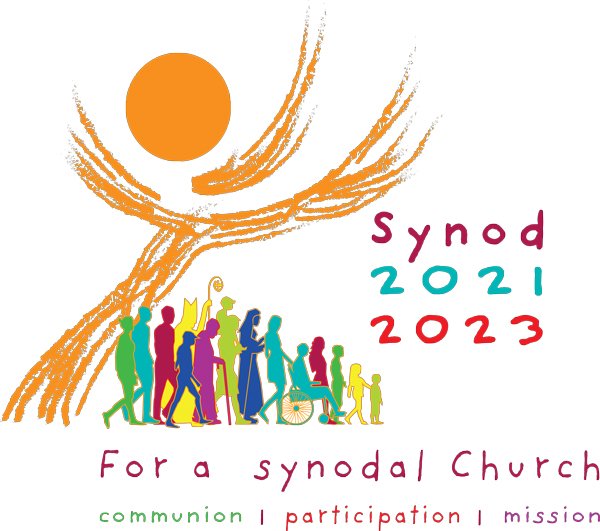
The U.S. Church and Hispanic Ministry experience
The preparatory document tells us that “It is a reason for great hope that more than a few Churches have already begun more or less structured meetings and consultation processes with the People of God. Where they have been marked by a synodal style, the sense of Church has flourished and the participation of all has given new impetus to ecclesial life.”(PD 7)
It is precisely in this context that I want to situate our history and our lived experience of synodality como pueblo católico hispano caminando en esta iglesia local.
The Church in the United States had several Plenary and provincial councils in the 19th century (U.S. Catholic Trivia: There were three plenary councils in the 1800s, know as the “Plenary Councils of Baltimore” (1852, 1866, 1884) and several more provincial councils. (Recently some have ventured it is time to convene a Fourth Plenary Council of Baltimore…)
We have structures like the USCCB (the difference between “conference” and “council” is that of consultative vs. legislative nature)
Some dioceses have had or are currently undergoing Diocesan Synods; most have established consultative bodies such as presbyteral councils, diocesan and parish councils, etc. Perhaps you are part of one of them.
Hispanic ministry in this country certainly has followed a profoundly synodal path, of the kind being called forth by Pope Francis for the entire church: Our caminar has been an exercise of “journeying together”: the people with the bishops, and the bishops with el Pueblo Hispano.
The five National Encuentros of Hispanic Ministry were convened by the bishops, always had elements of consultation and discernment with representatives of el Pueblo Hispano, and progressively expanded efforts of inclusion and participation of more people and more voices that led to various fruits/actions at the local, regional and national level, including the creation of a national office, regional offices, diocesan offices, the Plan Pastoral Para el Ministerio Hispano (1987) after the Third Encuentro Nacional; and the creation of various institutos de formación pastoral y litúrgica, as well as national associations of various kinds, including the one convening us today, the National Catholic Association of Diocesan Directors for Hispanic Ministry. Even the themes of the Encuentros were an expression of synodality, of that People of God that Journeys Together, “Pueblo de Dios en Marcha.”
The most recent Encuentros, Encuentro 2000 and the V Encuentro added their own flavors to the experience of synodality. While the Fourth Encuentro, Encuentro 2000, had less of a consultative component of the Pueblo Hispano, it was nonetheless a synodal exercise in which el pueblo hispano together with the bishops of the nation, led the rest of the Church in the United States in a double exercise of: a) reckoning with the diversity of peoples and traditions that form the rich mosaic that is the Catholic Church in the United States, the “Many Faces in God’s House,” and b) in a national celebration of the Jubilee Year 2000 that affirmed and rejoiced in such diversity as a gift.
The Quinto Encuentro returns to the process of consultation and formation to be missionary disciples. It also becomes an invitation to the entire Church to respond to the plea of the Hispanic Catholics, while at the same time asking Hispanic/Latino Catholics how they will respond, contribute, and exercise leadership, serving the needs of the entire People of God in the United States.
This massive effort involved the direct participation of close to 90 percent of the dioceses United States, with every episcopal region represented. We owe a big debt of gratitude to the bishops who convened it -having heard the clamor of the people and the promptings of the Spirit- and who supported and accompanied it, helping the entire Church in the United States to read the signs of the times, and offering a counter-cultural process to move the church’s mission forward, in dark and difficult times, trusting that the Holy Spirit was speaking to the Church through God’s people. We also give thanks to God for all the teams (national, regional and diocesan) that were responsible for carrying out this profoundly ecclesial process; special thanks to the theologians and pastoral practitioners that, making echo of Pope Francis’ call to build a church of missionary disciples, and a church that goes forth, helped all of us to grasp the elements of a synodal Church already present in Evangelii Gaudium.
All of them, together with the Holy Spirit expressed through the Sensus Fidelium Hispanorum, guided us through this truly synodal path, which we are in the process of implementing right now, and which has produced not only proceedings and recommendations, and numerous initiatives local and national, but more importantly, a“pastoral conversion” in more that a few hearts.
Like with the Synod on Synodality, the purpose was not “to produce documents, but to plant dreams, draw forth prophecies and visions, allow hope to flourish, inspire trust, bind up wounds, weave together relationships, awaken a dawn of hope, learn from one another and create a bright resourcefulness that will enlighten minds, warm hearts, give strength to our hands.” (PD 32)

Journeying Together
I want to name one more experience of synodality some of us are currently involved with. I am talking about Journeying Together: An Intercultural Encounter for Ministries with Youth and Young Adults. Hundreds of Hispanic/Latino young adults and ministry leaders working with young people are involved with thousand others from various ethnic and cultural backgrounds, and several dozens of bishops in this “synodal exercise” of listening to and accompanying young people, promoting intercultural dialogue and hoping to chart a path forward together for ministries with youth and young adults that are truly inclusive, reach out, and seek to bring the good news of salvation and message of Pope Francis’ apostolic letter Christus Vivit to young people of all cultural backgrounds and socioeconomic status and life paths.
In the midst of a global pandemic, and the crisis and isolation that has brought with it, the social crispation, the racial reckoning, hatred and violence, and political polarization that affect our country, Journeying Together created a sacred space, virtual for the time being, where young people, the bishops and ministry leaders have been able to have respectful yet honest conversations about faith and life, racism and inclusion, and all issues affecting them as young people. We have been able to discuss what it means to be young and Catholic in this country and in their particular context, promoting not just dialogue and understanding but also the forging of many new friendships in the Lord which transcended cultural and social boundaries. We are still in the middle of it, gearing towards the National event that hopefully will bring it all together.
The experience of Journeying Together embodies very clearly that synodal way that models itself after the example of the Jesus’ ministry: “A common trait throughout Jesus’ ministry is that faith always emerges when people are valued: their plea is heard, they are aided in their difficulty, their availability is appreciated, their dignity is confirmed by God’s gaze and restored within the community.” (Vademecum for the Synod on Synodality, 4.1)
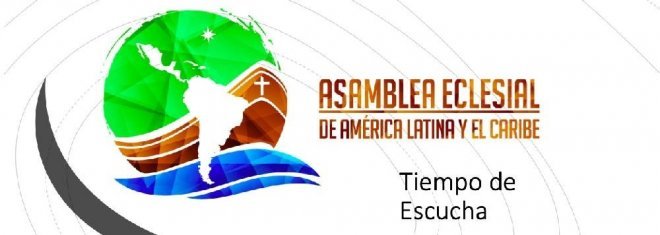
The challenge and the opportunity for those in Hispanic Ministry
As a particular segment of the Faithful People of God journeying in the United States of America, we have a long tradition of the “lived experience” of synodality. We know how it works; we have experienced these processes time and time again. Lo hemos vivido, lo hemos mamado; it has been handed down to us by our fore-fathers and fore-mothers in this ministry.
So, I would venture to say, that we have been given a gift that the Church needs in this moment, and that we need to put at the service of the entire People of God journeying in the United States.
I firmly believe that we have a call and a particular responsibility, individually and collectively, to help facilitate the processes of reflection on synodality in the local churches where we live and that we represent here. Given our lived experience of approaching ministry as a “pastoral de conjunto” (a communion in ministry that looks at issues not in isolation but in all its various aspects and dimensions, looking at the whole picture in a collaborative way); as well as our continuous using of the methodology of the pastoral circle (see-judge-act) in our common discernment, we, Hispanic/Latino Catholics in the United States can certainly help translate the language of “synodality as a way of being” for our brothers and sisters, even for our shepherds (especially in places where it is not really well known or understood, or where it is practiced in a very limited way that restricts consultation and participation.)
Like everyone else, Hispanic Catholics also need to deepen our understanding of synodality by participating in the common reflection of the fundamental questions posed be the synod. There are certainly areas where we too can grow and encourage our people to grow: grow in discernment, grow in participation and grow in co-responsibility. If we look at the ten central themes for the synod, Ecumenism is certainly a key area where we need to grow. We are conscious that the synodal path requires conversion also on our part, personal and communal, that will lead to pastoral conversion of structures and methodologies.
I dare to say to you, diocesan directors for Hispanic ministry and your teams, that you are -you should be and could be- a key piece for the success and the taking root of the synod’s call in your local church. Son pieza clave para la facilitación de los procesos del sínodo en sus comunidades.
At the risk of being called a troublemaker (what’s new, right?), I encourage you, I beg you, with all humility but with firm resolve, present yourselves to your bishops and tell them: We have heard the call and we can help! We are with you; we are taking this seriously; we want to be part of this; we need to be part of this, and the local church cannot afford to do this without us, and without all the members of the diocesan church, in all their diversity, being represented. And we can help facilitate that.
Sure, like Saint Juan Diego, some may find doubt and even rejection. But learning from his example we know that our testimony and action, aided by perseverance, guided by the impulse of the Holy Spirit, united to that of our brothers and sisters of every culture and race, can lead to the conversion of hearts of our pastors and our colleagues in ministry; and together we can become instruments that help usher a new era of evangelization and a way for the local church to be all that She is called to be.
I tell you that, in many cases, you will also find weary but grateful shepherds, and their delegates, who are eager to find “helpers” that can assist in coordinating the diocesan phase of the synod at the parish and diocesan level, and later, its implementation.
Don’t be shy. “For God has not given us a spirit of timidity, but of power and love and self-discipline.” (2 Tim 1:7)
For the greater glory of God, let’s be part of a Church that journeys together towards the establishment of the Kingdom of God.
Para la mayor gloria de Dios, seamos parte integral de la iglesia peregrina y misionera, caminando y trabajando juntos en la construcción del Reino de Dios.
Así sea.
*Mar Muñoz-Visoso is Executive Director of USCCB’s Secretariat for Cultural Diversity in the Church

